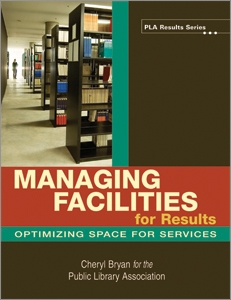Primary tabs
You don't need to be an ALA Member to purchase from the ALA Store, but you'll be asked to create an online account/profile during checkout to proceed. This Web Account is for both Members and non-Members. Note that your ALA Member discount will be applied at the final step of the checkout process.
If you are Tax-Exempt, please verify that your account is currently set up as exempt before placing your order, as our new fulfillment center will need current documentation. Learn how to verify here.
- Description
- Table of Contents
- About the authors
- Reviews
Carving out new service areas within existing space, forgoing massive additions or expensive new buildings, offers a cost-effective solution for budget-conscious libraries. Building from the proven Results Series model, this volume dovetails with the basics outlined in The New Planning for Results: A Streamlined Approach.
This new hands-on workbook in the Results Series guides library directors, staff, and boards through the process to
- Prioritize new services that need space
- Make plans and identify an appropriate location
- Present the case to funding authorities
- Conduct a "gap analysis"
- Find resources to reallocate and see what new items are needed
- Identify building professionals to assist with alterations
It's supplemented with 23 workforms to support the information and collection process. Three toolkits provide technical assistance on calculating square footage, assessing the message, and complying with the Americans with Disabilities Act (ADA) requirements.
With examples ranging from small to large small public libraries, the process is equally valuable for school, special, and academic librarians who are faced with similar space repurposing challenges. Any library can embrace these practical, proven techniques for addressing community needs -- by creating a blueprint that prioritizes services and creates the space for them within their existing facility.
List of Figures
Acknowledgments
Introduction
Chapter 1 Project Definition and Planning
Chapter 2 Committee Orientation and Data Collection Orga¬nization
Chapter 3 Resources Required and Allocated to Support the Activity
Chapter 4 Gap Analysis and Recommendations
Chapter 5 Prepare Recommendations and Present Reports
Tool Kits
A Calculating Square Footage
B Assessing Your Library's Physical Message
C Americans with Disabilities Act Requirements
Workforms
1 Facility Projects
2 Project Priorities
3 Preliminary Task List and Timeline
4 Need for Outside Experts
5 Facility Resources—Data Elements
6 Project Description—General
7 Project Description—Physical Plant, Space, and Spatial Relationships
8 Need—Furniture and Equipment
9 Have—Furniture and Equipment
10 Need—Shelving
11 Have—Shelving
12 Need—Physical Plant and Technology Support
13 Have—Physical Plant and Technology Support
14 Need—Access, Spatial Relationships, and Signage
15 Have—Access, Spatial Relationships, and Signage
16 Square Footage—Needed and Current
17 Gaps and Options
18 Considerations for Placement of the Activity
19 Expense Estimates for Options
20 Preliminary Project Time Estimates
21 Option Evaluation
22 Furniture and Equipment List
23 Cost Compilations
Index
Cheryl Bryan
Cheryl Bryan is currently assistant administrator for Consulting and Continuing Education at Southeastern Massachusetts Library System. A popular trainer, consultant and speaker, she has many decades of experience guiding librarians through long term planning, building programs, and major service changes.
Public Library Association (PLA)
The Public Library Association (PLA) is a division of the American Library Association. PLA’s core purpose is to strengthen public libraries and their contribution to the communities they serve. Its mission is to enhance the development and effectiveness of public library staff and public library services.
"This book is so well designed that it will be used over and over again. It is an exceptional resource that should be required reading for any librarian or administrator planning a renovation or move."
--The Electronic Library



